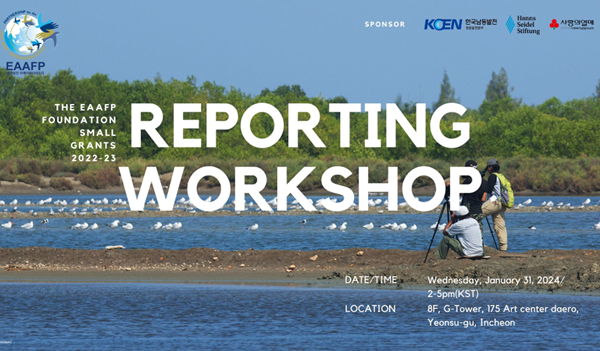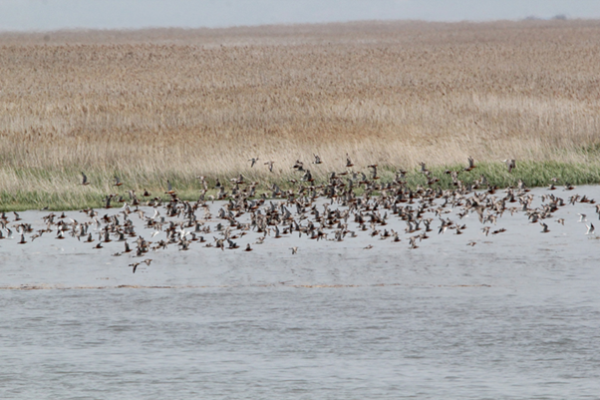On 5th December 2022, the 2022 Global ESG Management Forum and the 2022 Incheon Ilbo ESG Management Awards Ceremony were held in Songdo Convensia, Incheon, Ro Korea. At the 2022 Global ESG Management Forum hosted by Incheon Ilbo (Newspaper), keynote lectures and discussions took place under the theme of ‘ESG management discourse and Korea’s climate change response strategy’. In recent years, the evaluation of non-financial factors such as ESG (Environmental, Social, and Governance) has become an important investment standard for sustainable growth.
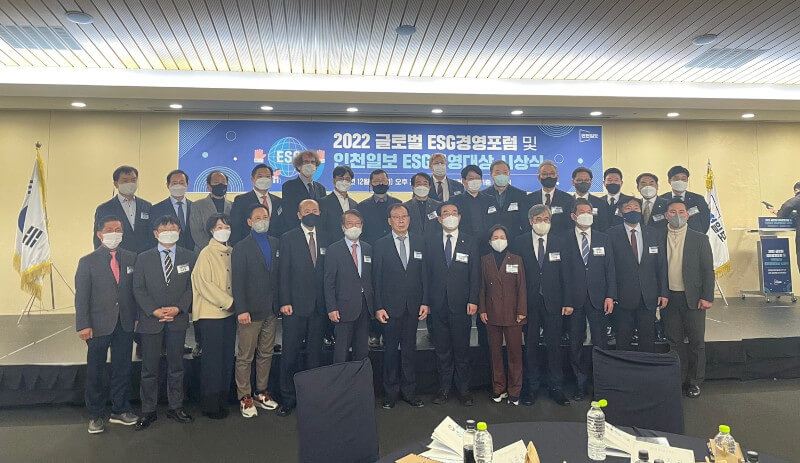
Group photo of invited attendees ©EAAFP Secretariat
In his keynote speech which opened the forum, Dr. Un-Chan Jeong, Chairman of the Korea Institute for Shared Growth (KISG), said that ESG management should be practiced not simply to avoid financial disadvantages, but to achieve continuous shared growth. He emphasized cooperation between companies for sincere ESG management, citing the US Inflation Reduction Act (IRA) and Europe’s Core Raw Material Act (CRMA) as examples. Emphasizing that the philosophy contained in Taxonomy is also reflected in the issues and values dealt with in shared growth, Dr. Jeong also urged companies to add the philosophy of shared growth to corporate management and practice eco-friendly production processes, active cooperation with partners, and transparent management.
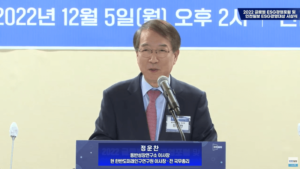
Dr. Un-Chan Jeong, Chairman of the Korea Institute for Shared Growth (KISG), giving a keynote speech ©Incheon Ilbo TV
After the keynote speech was the discussions in the forum were chaired by Mr. Man-Eui Lee, Chairman of the Korea Greenhouse Gas Reduction and Recycling Association. Mr. Doug Watkins, the Chief Executive of EAAFP, Dr. Bernhard Seliger, the Chief Executive of the Hanns Seidel Foundation Korea Office, Mr. Bo-Gyun Sim, President of KESG Evaluation Institute, Mr. Ki-Chul Oh, Permanent Director of Green Asia Network, and Dr. Jae-Hyun Lee, a visiting professor of the Department of Urban and Environmental Engineering at Incheon National University, participated as panelists.
The discussion started with the remarks of Professor Jae-Hyun Lee from Incheon National University. Professor Lee said that there is a limit to preparing countermeasures for carbon neutrality issues focused on the central government and that local governments should take direct actions to decentralize the efforts. He also emphasized that ESG management is not the responsibility of large corporations alone and that small and medium enterprises and civil society organizations should realize ESG together.
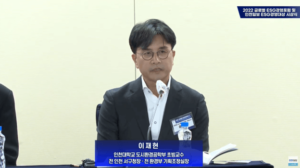
Dr. Jae-Hyun Lee, a visiting professor at the Department of Urban and Environmental Engineering at Incheon National University, participating in the discussion © Incheon Ilbo TV
Mr. Doug Watkins, Chief Executive of the EAAFP Secretariat emphasized the value of Incheon’s wetlands in terms of environmental protection, citing Incheon’s flagship species Black-faced Spoonbill and Songdo tidal flat (EAAF 145) as examples. Mr. Watkins revealed that the activities to protect and restore coastal wetlands are also effective in coping with climate change, not just in conserving migratory birds and their habitats. Mr. Watkins further called for active action by the government, businesses, and civil society to prevent climate change.
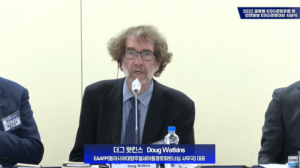
Mr. Doug Watkins, the Chief Executive of the EAAFP Secretariat, participating in the discussion © Incheon Ilbo TV
Dr. Bernhard Seliger emphasized the importance of coastal forests by citing examples of cooperation with partners such as EAAFP in carrying out external activities with Democratic People’s Republic of Korea. He further stressed that the work of creating coastal forests is important for migratory birds, various biological resources, and local residents who make a living through agriculture.
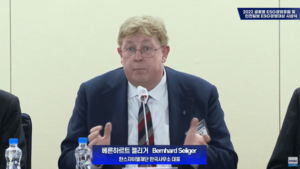
Dr. Bernhard Seliger, the Chief Executive of Hanns Seidel Foundation Korea Office, participating in the discussion © Incheon Ilbo TV
Mr. Oh said that new leadership is needed to respond to the climate crisis. He emphasized that government-led policies cannot be successful without the support of citizens, and active support is needed for citizens to directly participate in resolving the climate crisis and to train and dispatch climate experts for this purpose.
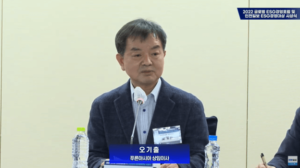
Mr. Ki-Chul Oh, Permanent Director of Green Asia Network, participating in the discussion © Incheon Ilbo TV
Mr. Sim stressed the need to reduce greenhouse gas emissions through energy conversion policies. He presented a plan to practice carbon neutrality using Incheon Smart City and requested active cooperation and support from Incheon City.
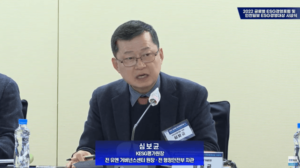
Mr. Bo-Gyun Sim, President of KESG Evaluation Institute, participating in the discussion © Incheon Ilbo TV
In the following discussion session chaired by Mr. Man-Eui Lee, Mr. Lee emphasized the need to prepare measures to minimize economic damage to the local industrial communities in the transition to a carbon-neutral society to prevent climate change.
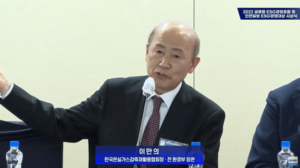
Mr. Man-Eui Lee, Chairman of the Korea Greenhouse Gas Reduction and Recycling Association participating in the discussion © Incheon Ilbo TV
Lastly, the Incheon Ilbo ESG Management Awards Ceremony was held to recognize individuals, institutions, organizations, and corporates based in Incheon and Gyeonggi Province who practised exemplary ESG management.
You can watch the video of the whole 2022 Global ESG Management Forum and the Incheon Ilbo ESG Management Awards Ceremony via this link.

